Groove Clinic: An Interview with Andrew Gouche
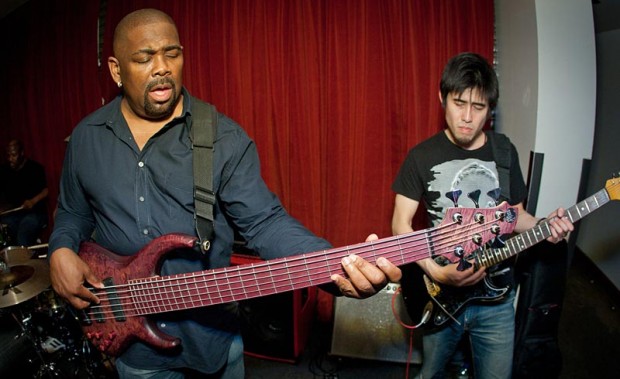
Photo credit: Ilán Terrell
As a long-time camper and recent instructor at Gerald Veasley’s Bass Boot Camp, I’ve spent many a camp learning from some of the bass greats. A few years ago, Andrew Gouche appeared for the first time as an instructor at the BBC, bringing along gospel and a whole lotta soul.
This year, Andrew returned for the second time to teach a groove clinic and master class. I was lucky enough to sit down with him for a few minutes to discuss how he got his start as a bass player, the evolution of his career, his MTD signature bass and some learning suggestions for other players.
Andrew has become one of the most influential gospel players on the scene and has had an extensive career touring and recording with artists such as Andrae Crouch, the Winans, Chaka Khan, Gladys Knight and various others. He also has established his own group in Los Angeles, known as the Band of Brothers, and has worked as a bandleader, music director and sideman.
How did you get started playing and what made you pick up the bass?
I got inspired to play bass when I was 14. I saw Larry Graham with Graham Central Station on Soul Train, asked my mother to get me a bass, and she got me one for Christmas in 1973. I learned mostly from listening to records and the first bass line that I worked out was “Superfly”, by Curtis Mayfield. The movie had just come out, and I learned most of the songs on that record… “Freddie’s Dead”, “Pusherman”, etc.
Where did you first start playing out and what were some of your first gigs?
Before I ever got out to gig, I played in church and used to sing in the choir. The pastor was a very famous gospel singer named Reverend James Cleveland, and he used to let me sit by the side of the stage and figure out the songs, especially because his bass player lived in New York and we were in L.A. Then, when I was 16 or 17 years old, I was doing club gigs in L.A., even though I wasn’t old enough yet to play in the clubs.
What was one of the first gigs you were really excited about getting? One that took you out of your comfort zone a bit?
The first gig that I was in actually in awe of getting was with Andrae Crouch, a very well known gospel singer. I met him while I was touring with Reverend Cleveland and we were playing a show in Israel called “Gospel Goes to the Holy Land.” The show featured a few different gospel artists and Andrae, who was one of the biggest gospel artists in the world at the time, came up to me, said that he loved the way I played and wanted to work with me.
A month later, I was in the studio recording with him, Joe Sample on piano and Bill Maxwell on drums. The first day that I was there, I literally couldn’t play. I thought that at the end of the day, they were just going to say “thank you” and try to find someone else. Instead, they told me to come back the next day, since they knew that I was nervous. I really appreciated getting that second chance and the next day, all the jitters were gone. I got to fix all of my mistakes, and I went on to play with Andrae for 11 years.
So it seems like your career has had a very natural progression…
Yeah, everything that I’ve done has been one thing that would progress to another. I met Andrae [thanks to playing] with James Cleveland, and then met the Winans while I was with Andrae. Another cool thing was that I was born in L.A., so I never had to make a move, and I was very blessed to live in a place where there was a lot going on. I almost considered moving to New York once, but New York was the only city that ever made me feel like I was from a small town.
You had a good story about how you got involved with Chaka Khan’s band. Can you tell us about that?
I was playing in a club in L.A. with Karen Briggs (a former violinist with Yanni) and Chaka came to one of the gigs. She was freaking out about my playing, came up to me after the gig, gave me a kiss, and said she wanted me to go on tour with her. I didn’t go then, but a few years later, I got a call from her manager saying that she had been looking for me and she wanted me to be her musical director. A couple of years later, after I had been playing with her for a while, I asked her why she had wanted me to be her musical director… She said “I just knew you could do it.” That’s how I ended up doing that for six years.
Many of the modern gospel players have a tendency to de-tune their basses, which is something that you’ve been doing for years. How and why did you decide to start doing that?
In gospel music, a lot of the tunes are in flat keys… Eb, Ab, Bb. When I started playing, there was no such thing as a 5-string bass; the Fender Jazz was the pinnacle of where you could go with a standard bass. Playing a lot of the gospel songs, the higher Eb just didn’t sound deep enough and didn’t seem right. Meanwhile, a friend of mine, a well-known gospel player named Joel Smith, started tuning down to Eb. I wanted to go lower than him, so I tuned down to D. Then, when they came out with 5- and 6-string basses, I tried to use standard tuning again. I had been playing tuned down for so long that my brain wanted to hear a certain note and then see it on the instrument. I have perfect pitch and developed my ear along with the instrument, so I couldn’t get used to standard tuning again and continued to tune down. It’s funny how popular that has become and how a lot of the younger gospel players don’t know where that came from… I was one of the first guys to do that.
Speaking of basses, you’ve got a beautiful MTD Signature bass. How did that come about?
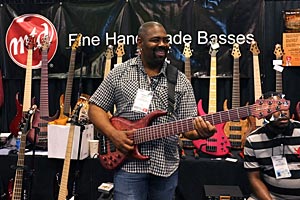 Michael Tobias actually came to me. I had been playing his basses since 1987, and one day he told me that he wanted to do a signature bass. The great thing about Michael is that he knows my sound and can make it. I’m not much of a technical guy, but I mentioned certain specific elements about my tone, such as a boost of the bass frequency at 100, a mid scoop from 1-3k, and a boost at 6k for treble. Michael has the greatest gift of knowing which woods do what, and the only thing that I specified was the plum color for the body and the shape of the neck.
Michael Tobias actually came to me. I had been playing his basses since 1987, and one day he told me that he wanted to do a signature bass. The great thing about Michael is that he knows my sound and can make it. I’m not much of a technical guy, but I mentioned certain specific elements about my tone, such as a boost of the bass frequency at 100, a mid scoop from 1-3k, and a boost at 6k for treble. Michael has the greatest gift of knowing which woods do what, and the only thing that I specified was the plum color for the body and the shape of the neck.
It’s rare for bass players to have their own band, since we’re usually hired as sidemen, but you’ve got a really unique group out in L.A. How did the Band of Brothers get started?
After touring for 20 years, from ’77 til ’97, I decided to quit… I became burned out from dealing with artists and the negative aspects of the music industry. I had been dealing with worrying about getting paid the right amount, getting paid on time and being treated well. It got to the point where I was starting to lose the love that I had for playing, and at the time, I said that I would never be a sideman again. I didn’t know what I was going to do, I didn’t have any kind of plan, and somehow I ended up making more money the year I decided to stop touring than I ever had before.
I took a different path; I had a song that I wrote and produced on a multi-platinum record, and I got introduced into a whole new stream of revenue that you don’t get if you’re just a sideman. I always did sessions, and then I started playing around town more.
The gig at the Town House, a club in L.A., just fell into my lap. It used to be a straight-ahead jazz jam session on Sunday nights. One night, the previous band flaked on the club in order to try and get more money. The club called me, asked if I could get a band together, and I was able to get some of my favorite people: Chris Coleman on drums, Donald Hayes on Sax, Yohei Nakamura on guitar and Eddie Brown on keys. We all got together, started to have fun, and [we] have been doing that for two years now.
When you’re playing with the people you really want to play with, especially if they’re in demand, the gigs are all contingent on everyone’s schedules. We have a continuity that was developed over the past two years, so we usually don’t have subs on the gig and we only play when we can all make it.
You’re known for your gospel chops. I’m guessing you can play shout music really, really fast!
I’ll go up to 160 bpm. I just do it with a drum machine and try to keep it going for a couple of minutes to see how fast I can go. It’s great to go fast, but I want it to groove and be funky.
I know you were self taught. Is there anything that you would recommend to other players who are self taught or players who want to make a living playing music?
I became the player that I am because I exposed myself to different styles of music. I always had a yearning to know more… latin, samba, rock… I just like doing different things. I’d love to play a country gig because I like the songs, and I love doing pop songs with my band. Someone gave me a Beatles complete set for my birthday, and my band does a cool version of “Eleanor Rigby”.
Try to expose yourself to different things, get out of the kind of music you like, and learn a wide variety of styles. You’ll figure out how to incorporate the different things that you learn into the music that you already do.
Also, when people ask me for advice, I tell them to follow their heart. You need to do what feels right, but equip yourself with the tools to get the job done. Do whatever it takes to improve, learn, and conquer. One of my mottos is: we do what we gotta do so we can do what we want to do.
The cool thing about music is that it can take you a lot of different places. It’s weird when I talk about the things that I’ve done… things that most people don’t get to do, such as play for the President, or travel the world.
This is your second Bass Boot Camp. What draws you to participate in this kind of event?
I think it’s a great thing because many of the music events that are done around the world are geared towards drummers. What Gerald does is great, because it shows that there’s a market for this kind of learning among bass players. I had never thought of myself as a teacher, since I didn’t think that I’d have the temperament for it, but after doing the first camp, I realized that I could teach and share what I know with other people.
It’s also flattering to know that people are interested in what I can do. There’s a great fellowship and community here that I really appreciate.
Ryan Madora is a professional bass player, author, and educator living in Nashville, TN. In addition to touring and session work, she teaches private lessons and masterclasses to students of all levels. Visit her website to learn more!
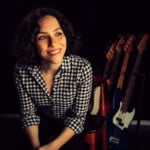
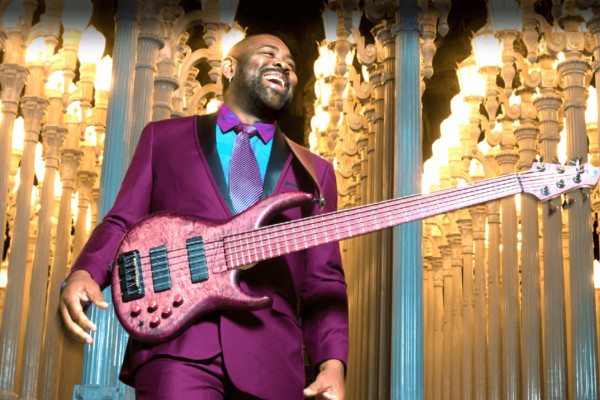
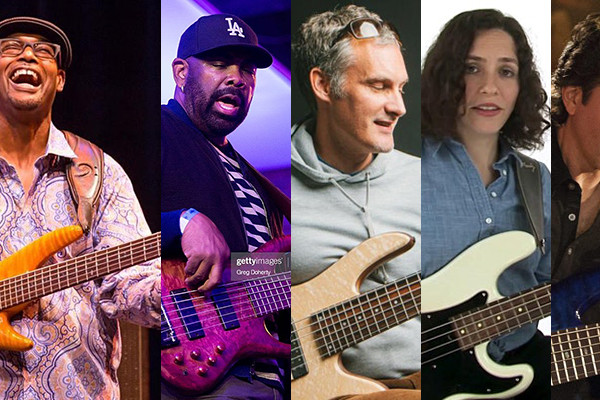
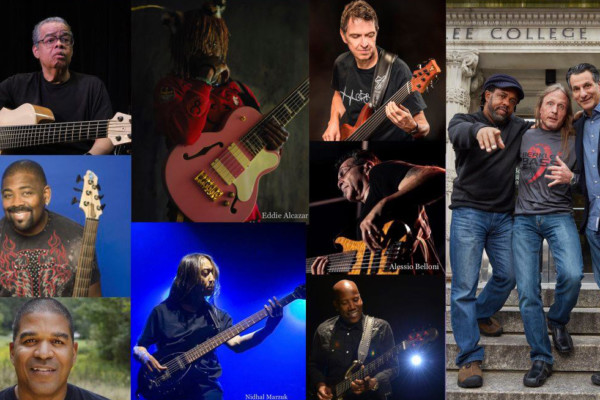
he seems like the coolest dude.
He IS the coolest dude. He was one of the instructors @[196672077030477:274:Gerald Veasley’s Bass BootCamp] this year. Janiece, you should make plans to attend the next one. You will love the experience.
@[1257926492:2048:Jean-Christophe Boissy] You’ve been?? I need to get on my game!! lol
7 times in 8 years. It’s a great experience.
@[1257926492:2048:Jean-Christophe Boissy] wow!! awesome. do you have any videos up of you playing? like on youtube?
Well, her eis a video of the 2011 BBC: https://www.facebook.com/#!/photo.php?v=1638104673322
@[1257926492:2048:Jean-Christophe Boissy] wow!!! ur solo was a breath of fresh air!!! but they were missin ur bassline while u were soloin hah! u had to remind em wat it was! lol good stuff!
It was fun jamming with one of my favorite bass players and the other fantastic musicians. This could be you if you join us next year ;-)
@[1257926492:2048:Jean-Christophe Boissy] that would be awesome! i gotta get my chops up right quick lol
Trust me, you are ready for it. You already play MUCH better than me the first time I attended. it’s for all levels.
@[1257926492:2048:Jean-Christophe Boissy] how do u know how well i play??
It’s always a treat to read anything about Andrew Gouche. He is someone I deeply admire because of his ability to create a niche for himself and influence the very nature of bass playing.
1 of Robert Asencio’s Biggest Bass Influences: Andrew Gouche. Check out this awesome interview by No Treble. Like: Michael Tobias Design: MTD American Handmade Bass & Guitar & MTD Kingston Basses.
Great read and insight.
Andrew is my greatest inspiration as a pro bassplayer! What a great read.
I wish he would answer some of his messages so I could find out what effect pedals he uses.
This guy is awesomeon bass,he and Justin Raines are my mentors,love these guys!!!